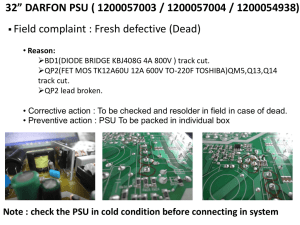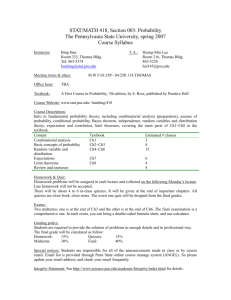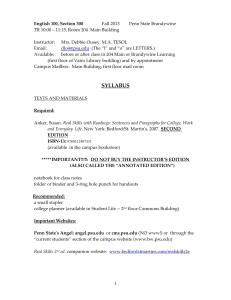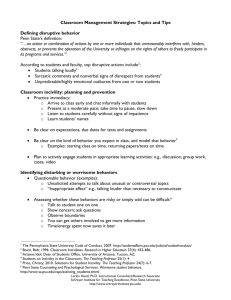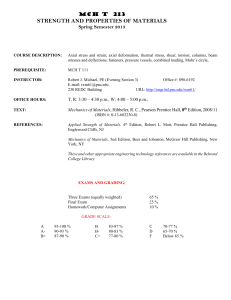Course Name and number
advertisement
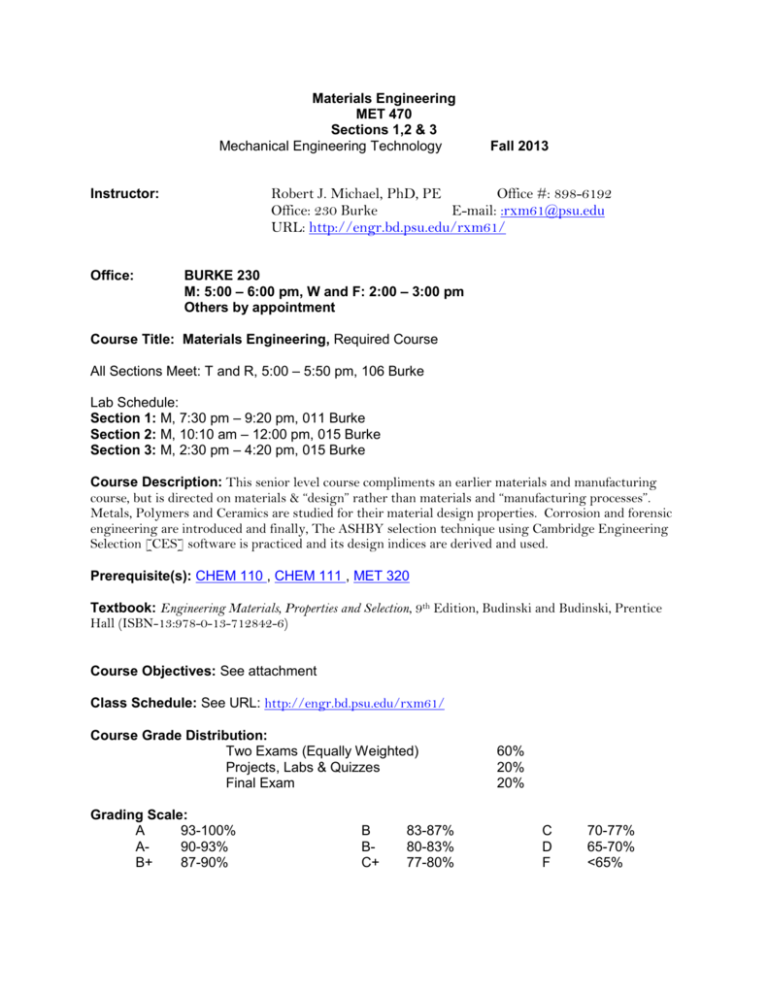
Materials Engineering MET 470 Sections 1,2 & 3 Mechanical Engineering Technology Robert J. Michael, PhD, PE Office #: 898-6192 Office: 230 Burke E-mail: :rxm61@psu.edu URL: http://engr.bd.psu.edu/rxm61/ Instructor: Office: Fall 2013 BURKE 230 M: 5:00 – 6:00 pm, W and F: 2:00 – 3:00 pm Others by appointment Course Title: Materials Engineering, Required Course All Sections Meet: T and R, 5:00 – 5:50 pm, 106 Burke Lab Schedule: Section 1: M, 7:30 pm – 9:20 pm, 011 Burke Section 2: M, 10:10 am – 12:00 pm, 015 Burke Section 3: M, 2:30 pm – 4:20 pm, 015 Burke Course Description: This senior level course compliments an earlier materials and manufacturing course, but is directed on materials & “design” rather than materials and “manufacturing processes”. Metals, Polymers and Ceramics are studied for their material design properties. Corrosion and forensic engineering are introduced and finally, The ASHBY selection technique using Cambridge Engineering Selection [CES] software is practiced and its design indices are derived and used. Prerequisite(s): CHEM 110 , CHEM 111 , MET 320 Textbook: Engineering Materials, Properties and Selection, 9th Edition, Budinski and Budinski, Prentice Hall (ISBN-13:978-0-13-712842-6) Course Objectives: See attachment Class Schedule: See URL: http://engr.bd.psu.edu/rxm61/ Course Grade Distribution: Two Exams (Equally Weighted) Projects, Labs & Quizzes Final Exam Grading Scale: A 93-100% A90-93% B+ 87-90% B BC+ 83-87% 80-83% 77-80% 60% 20% 20% C D F 70-77% 65-70% <65% Materials Engineering MET 470 Relationship of course to program outcomes: MET 470 contributes to the following baccalaureate degree program outcomes: [1] Students should be able to identify, analyze and solve technical problems in the areas of materials, manufacturing processes, mechanics, strength of materials, and in the fluid and thermal sciences. [2] Students should be able to use the appropriate computer technologies during the solution of applied engineering problems. [4] Students should be able to plan and conduct experimental measurements using modern test and data acquisition equipment and be able to analyze and interpret the results. [5] Students should be able to identify and use appropriate methods to validate solutions to engineering problems. Attendance Policy: “A student should attend every class for which the student is scheduled and should be held responsible for all work covered in the courses taken." Students who fail to attend will not generally be allowed to make up quizzes or exams unless a prior arrangement has been made. Absences such as athletics travel notice, ROTC notice, family emergencies, etc., must be supported by written documentation prior to class. Note that in case of illness the student is responsible to notify the instructor before the class begins and to show evidence that medical attention was obtained. (See Policies and Rules for Students on the PSU website at http://www.psu.edu/ufs/policies) Makeup Policy: Quizzes will be made up only if the makeup is arranged before the scheduled quiz period, and only in the case of an excused emergency. Homework Policy: No late homework will be accepted, from any person for any reason. Homework collection will be announced at least one class period in advance. Some class time between the announcement and the collection will be used to answer questions on the homework. Homework collection will be at the beginning of class for which it is announced. For assignments labeled as ‘homework’, collaboration is allowed. For assignments labeled as ‘quiz’, whether they be in-class or take-home, collaboration is not allowed and any evidence of such will be treated as academic dishonesty. Academic Integrity: Penn State Erie puts a very high value on academic integrity, and violations are not tolerated. Academic integrity is one of Penn State’s four principles to which all students must abide. Any violation of academic integrity will receive academic and possible disciplinary sanctions, including the possible awarding of an XF grade which is recorded on the transcript and states that failure of the course was due to an act of academic dishonesty. All acts of academic dishonesty are recorded so repeat offenders can be sanctioned accordingly. Students are encouraged to review more information on academic integrity which can be found at: http://www.pserie.psu.edu/faculty/academics/integrity.htm Support Services: Learning Resource Center: http://pennstatebehrend.psu.edu/academic/lrc/index.htm Library: http://www.behrend.psu.edu/academic/library/index.htm Computer Center: http://www.behrend.psu.edu/compcntr/compindex.htm General Policies, Rules & Procedures: http://www.sa.psu.edu/ja/procedures.shtml Note to students with disabilities: Penn State welcomes students with disabilities into the University's educational programs. If you have a disability-related need for modifications or reasonable accommodations in this course, contact the Disability Specialist in the Office of Student Affairs, Room 115 Reed Union Building, 898-6111. MET 470 Goals/Objectives: After completing this course the student should be able to: 1) Perform material selection for various families of materials including polymers, metals, and ceramics. Understand basic concepts of advanced material issues such as corrosion and forensic analysis. 2) To continue the sequence of courses that provide you a good foundation and basics in common mechanical engineering materials to use for life long learning in material properties and material responses to applications. 3) To prepare you to communicate effectively with a material specialist like a chemist, material scientist, polymer scientist, metallurgist, etc. 4) Study advanced topics in the design component of material properties to augment previous courses in the manufacturing processes (IET 101, 215, 216), and the shape and size courses (MCHT 213, 320). 5) To study an advanced computer technique for searches and selection of modern materials. To perform advanced searches using material indices and various material filters. 6) To continue the mission identified by MET advisory board for graduates to have a strong material and strength of materials background. 7) Prepare graduates for passing the material science portion of both FE and PE exam.

